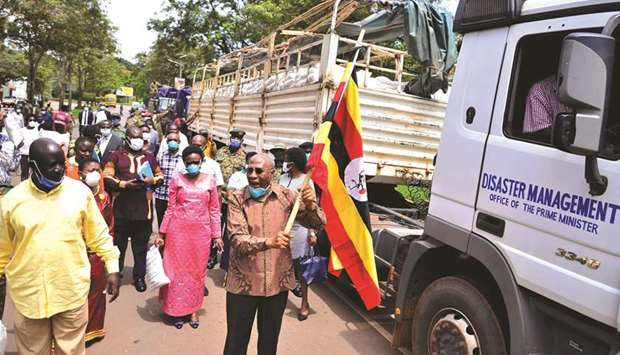Uganda’s crumbling public hospitals, doctors’ strikes and corruption scandals make its success in the fight against the new coronavirus all the more unlikely.
But the nation of 42mn people has recorded just over 1,200 cases and five deaths since March, a strikingly low total for such a large country.
As the number of cases in Africa approaches 1mn, Uganda’s experience shows what can be accomplished when a government with a firm grip on power acts quickly and enforces a strict lockdown.
But its success came at a cost, critics say. Jobs were lost, and economic growth is set to plunge to as low as 0.4% in 2020, from 5.6% last year, according to the World Bank.
Some pregnant women died in labour, unable to reach hospitals because of travel restrictions.
Security forces — criticised by rights groups for abuses — beat and arrested some rule-breakers.
Opposition leaders accuse the government of using the pandemic as an excuse to restrict political gatherings and arrest opponents, charges the government denies.
“A jobless person is better than a dead person,” state minister for health Robinah Nabbanja told Reuters. “The lockdown was completely justified.”
Uganda’s approach contrasts with that of many other African countries, which did not impose such strict measures and began easing them long before infections peaked to protect their fragile economies and mostly poor populations.
Some now face rapidly accelerating outbreaks that could overwhelm their public health systems, the World Health Organisation (WHO) has warned.
Uganda’s stringent measures bought the government time to prepare its health system and learn lessons about the disease, said Tim Bromfield, regional director for East and Southern Africa at the Tony Blair Institute for Global Change, a UK-based think-tank.
“All governments are balancing lives versus livelihoods.”
Uganda closed schools and banned large gatherings three days before confirming its first case on March 21. By the end of March, most businesses were shut, vehicle movement was banned, and an overnight curfew was in force.
Masks became mandatory in public in May. The East African nation’s response was shaped by battling deadly infectious diseases like Ebola and Marburg virus, public health experts said.
The country was already on alert because of an Ebola outbreak in neighbouring Democratic Republic of Congo when Covid-19 hit, said Alex Ario, director of the government-affiliated National Institute of Public Health. Teams were in place to educate the public and trace those infected. Passengers were already being screened at airports. Isolation wards were ready to receive patients, and anyone infected was hospitalised.
“Uganda knew where to conduct their surveillance,” said John Nkengasong, head of the Africa Centres for Disease Control and Prevention.”

File photo shows Uganda’s Prime Minister Ruhankana Rugunda (centre) flanked by ministers, walking next to trucks carrying relief goods to be distributed to civilians affected by the lockdown, as part of measures to prevent the potential spread of Covid-19, in Kampala.
